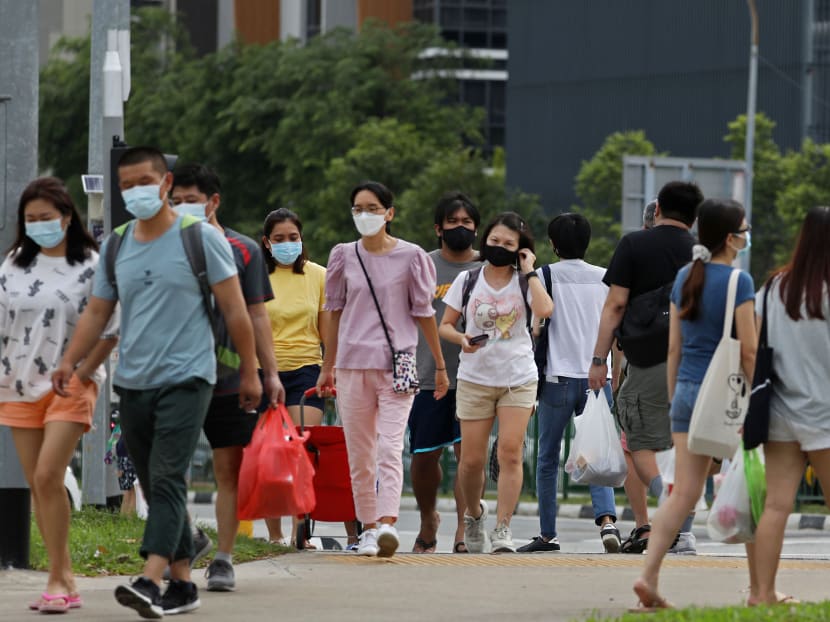‘Purpose, perseverance, support, money and sexual orientation’: Study maps out what makes a person in Singapore happy
SINGAPORE — A study on the happiness of Singapore residents has found that having a strong purpose in life, perseverance towards long-term goals and ample social support correlate to happier lives.

The study found three significant psychological and social predictors of happiness — purpose, perseverance and social support.
- The State of Happiness Study looked at individual-level factors, such as one’s sense of purpose, perseverance and social support
- These factors were responsible for 17 per cent of a person’s happiness score
- Socio-demographic factors such as household income and sexual orientation also had a 15 per cent bearing on one’s happiness
- The study was conducted through an online poll of 1,230 respondents in 2020
SINGAPORE — A study on the happiness of Singapore residents has found that having a strong purpose in life, perseverance towards long-term goals and ample social support correlate to happier lives.
On the other hand, those who have lower household incomes, or are homosexual or bisexual, are more likely to be unhappy, the researchers concluded in their report, which was released on World Mental Health Day on Sunday (Oct 10).
Around 1,230 Singapore respondents were polled online between October to December last year for the study, which was conducted by social enterprise Happiness Initiative.
Its co-founder and lead researcher for the study Simon Leow said: “There is a large proportion of our population who do not suffer from a mental health condition, but yet are also not living a happy or fulfilling life.”
The State of Happiness Study, as it is named, thus provides an insight into how the well-being of these people can be improved, he said. The study can be read in full at https://happinessinitiative.sg/sohs/.
The report follows past research on the happiness of Singaporeans. In 2011, a Gallup poll concluded that Singapore was the world’s most emotionless country, though the Republic improved in the rankings in subsequent years.
Mr Leow’s study takes reference from the United Nations’ World Happiness Report, which looked at national-level factors such as economic growth, life expectancy, level of freedoms and corruption to evaluate happiness levels among nations.
The Singapore study, on the other hand, identified five individual-level factors that affect happiness levels. Two are socio-demographic factors like sexual orientation and income, and three are psychological factors such as a sense of purpose and the perception of social support.
Respondents were asked to evaluate their life on a 10-point scale by answering the question “How good is my life?”, with zero being the “worst possible” and 10 being the “best possible” response. This is also known as a Cantril ladder.
It found that on average, Singapore respondents gave a response of 6.23. This is comparable to the 6.38 average in the UN’s 2021 study, which ranked Singapore 32nd out of 153 countries based on data before 2020. The Republic ranked behind Australia and Taiwan among jurisdictions in the Asia Pacific, and ahead of Thailand, Japan, the Philippines and South Korea.
However, there were some limitations in diversity of the respondents to the online poll. Compared against national statistics, the 1,230 respondents were disproportionately between 20 to 34 years old, were mostly single, female and university-educated.
WHAT THE STUDY FOUND
The study found three significant psychological and social predictors of happiness — purpose, perseverance and social support.
A person in Singapore who rated lowest on these three factors will likely score 3.36 on the Cantril ladder, which would coincide with Rwanda’s average on the UN report, said the researchers.
Conversely, if a person had rated these three factors highest, he would most likely report a Cantril ladder score of 8.46, which would be higher than an average person in Finland, which is the happiest country according to the UN study.
Combined, these three factors of purpose, perseverance and social support can influence one’s happiness score, as reflected by the Cantril ladder, by 17 per cent.
Socio-demographic factors, specifically the household income level and one’s sexual orientation, were also strong predictors of happiness.
For example, the Singapore study found that if an individual’s household income level increased from S$1,500 to S$2,500, he would likely have a 1.9 per cent increase in his happiness score.
On the other hand, people who are bisexual or homosexual are likely to give a score around 11 per cent lower on the Cantril ladder, which is a significant decrease.
Both factors combined can influence one’s happiness score by as much as 15 per cent, the study found.
“Socio-demographic factors are often not within our control, and we cannot readily change them. However, the motivation behind (the Singapore study) is to identify the factors which we can focus on to improve our happiness,” said the Happiness Initiative in a statement.
“If we can focus more resources into cultivating our sense of purpose, our perseverance, and also build strong social support networks, we can develop better versions of ourselves and a flourishing society,” it added.











